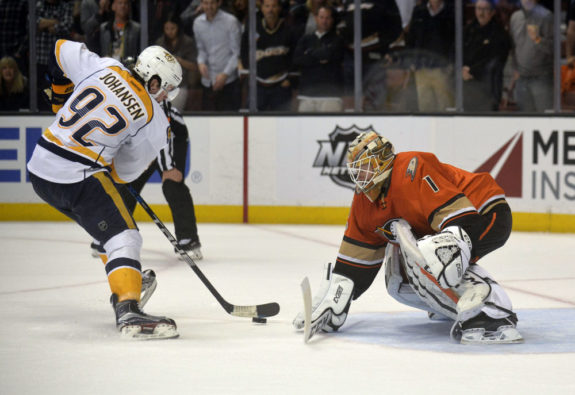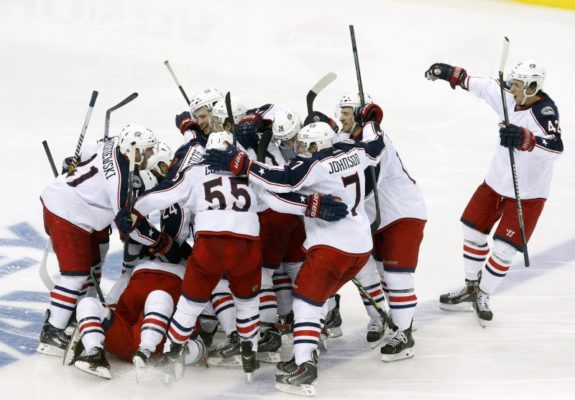Hockey’s overtime point has been subject to debate. At best, the point awarded to teams for losing after regulation time functions as a participation trophy. At worst, it opens the gates for lackluster teams to undeservedly find themselves in the postseason.
In the past, the NHL featured games that would end in a tie. The winner of a game would get two points while the loser would receive zero. If the game were to end in a tie, though, those two points would be split between the two teams.
This system was simple and fair — it allowed every NHL game, no matter the outcome, to be worth two points. In today’s NHL, if a game reaches overtime, the game suddenly becomes worth three points in total. The loser gets one point — a pat on the back — while the winner gets two.
Am I proposing we go back to games that end in ties? Not necessarily, though that would be a better alternative to what the league currently has in place.
My argument is very straightforward: the overtime point or “loser point” is ruining the game.
Origin & Shootouts
In time for the 1983-84 season, the NHL introduced overtime. If a game was tied after 60 minutes of play, a five minute overtime would ensue. If a winner was still undecided after overtime, the game would end in a tie.
The overtime point was adopted for the 1999-2000 season. If a game was tied at the end of regulation, each team would be awarded a point, but a second point would be awarded if a team found victory in overtime.
The point’s purpose was to produce fewer ties. With an extra point up for grabs, the league assumed teams would take more chances. What the point really does, however, is encourages teams to play it safe until they reach the overtime period. That way they are guaranteed a point if they lose. Why would you take chances if it means missing out on that point?
Ultimately, the NHL’s plan didn’t succeed. This is what ushered in the controversial shootout.

Prior to the 2005-06 season, the NHL installed the shootout. Shadowing a penalty shot, the shootout would break ties after five minutes of overtime, much like penalty kicks do in various professional soccer leagues. The shootout has birthed many critics since the year of its installation. This is where the overtime point did the league justice.
Owners, players, and fans alike are less likely to complain about a game being decided in a shootout if they walk away with a point for their troubles. Most arguments against the shootout stem from the belief that a team sport should not be settled in a one-on-one scenario. Some critics claim that you might as well end the game with a speed competition.
Supporters argue that the shootout is exhilarating — not to mention that it helps out television networks when it comes to scheduling programs.
The problem remains that teams were and still are being rewarded for losing a hockey game. If a team has the lead going into the third period, are they deserving of a point for losing the game in overtime? Even if a team is down three goals and comes back to lose a game in overtime, the point silently confirms that you don’t need to finish the job.
Effect on Playoff Brackets
The overtime point allows mediocre teams to squeak into the playoffs year after year.
This past season, the Toronto Maple Leafs finished with a record of 40-27-15. The 95 points resulting from this record were enough to propel the Leafs into the postseason. Trailing them were the New York Islanders, finishing the 2016-17 campaign with a record of 41-29-12, only good enough for 94 points.
It doesn’t take a mathematician to figure out the problem here. With one more win than the Maple Leafs, the Islanders have no business being below Toronto in the standings.

To make matters worse, the team truly deserving of the eighth seed found themselves in tenth place in the conference to end the season. The Tampa Bay Lightning finished the year with a record of 42-30-10 or 94 points.
Why should a team with more overtime losses and fewer wins be more deserving of a playoff spot? How is a team that is unable to compete for 60-plus minutes going to contribute to a competitive postseason? Hockey fans want winning teams in the playoffs, not teams that can’t finish the job.
Getting rid of the overtime point would also make for a closer playoff race at the end of the season.
Take last year’s Western Conference as an example. The Nashville Predators, who now find themselves in the Stanley Cup Final, finished the season with a record of 41-29-12. The Winnipeg Jets trailed the Predators by seven points at the season’s end, though they had 40 wins. The Los Angeles Kings trailed Nashville by eight points, though they were only behind by two wins.
The Predators ultimately deserve the result of their regular season performance, but judging teams by their records, not points, would have made for an exciting race out west. Even with two or three games remaining in the season, Winnipeg and Los Angeles would have had a shot at the eighth seed in the Western Conference.
Possible Solutions
There are a number of directions the league could go in finding a solution to the issue revolving around the overtime point.
The first is this writer’s favorite: simply getting rid of the point. A team would get two points for a win, and zero for a loss. In this case, the point system is rendered useless as you could determine the standings based on wins and losses alone.

Another option is to conform to soccer. In soccer, the winner receives three points while a draw results in a point going to each of the participating teams.
In the NHL’s case, one point would be awarded for the overtime loss while three points would be awarded to the victor. This approach is an improvement, for a win becomes more valuable. How does a loss in overtime equate to half of a win? Still, this system is flawed, as some games are worth more points than others.
An unpopular alternative is to return to games ending in ties. While a winner would receive two points, those two points would be split between the two teams if the game ended in a draw.
No matter one’s opinion on how the league should address the issue, no one can deny that there is indeed a problem. The overtime point is ruining the greatest sport on ice, and it’s about time someone does something about it.